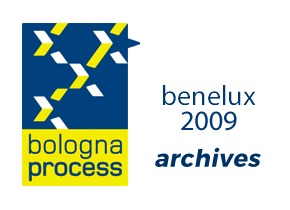Qualifications Frameworks / Three-Cycle System 2007-2009
Glossary on Qualifications frameworks - 2005

This glossary was contained in the report of the Bologna working group on qualifications frameworks submitted to and accepted by the 2005 Bergen Ministerial meeting.
Credit: a quantified means of expressing the volume of learning based on the achievement of learning outcomes and their associated workloads.
Cycle: the three sequential levels identified by the Bologna Process (first cycle, second cycle and third cycle) within which all European higher education qualifications are located.
Europe/European: Europe/European refers to those countries that are signatories to the Bologna Declaration, whilst "national" is used to describe the contexts within each of those countries or education systems.
Framework for Qualifications of the European Higher Education Area: an overarching framework that makes transparent the relationship between European national higher education frameworks of qualifications and the qualifications they contain. It is an articulation mechanism between national frameworks.
Learning outcomes: statements of what a learner is expected to know, understand and/or be able to do at the end of a period of learning.
Levels: represent a series of sequential steps (a developmental continuum), expressed in terms of a range of generic outcomes, against which typical qualifications can be positioned.
National framework of qualifications (higher education): the single description, at national level or level of an education system, which is internationally understood and
through which all qualifications and other learning achievements in higher education may be described and related to each other in a coherent way and which defines the relationship between higher education qualifications.
Profile: either the specific (subject) field(s) of learning of a qualification or the broader aggregation of clusters of qualifications or programmes from different fields that share a common emphasis or purpose (e.g. an applied vocational as opposed to more theoretical academic studies).
Qualifications (higher education): any degree, diploma or other certificate issued by a competent authority attesting that particular learning outcomes have been achieved, normally following the successful completion of a recognised higher education programme of study.
Qualification descriptors: are generic statements of the outcomes of study. They provide clear points of reference that describe the main outcomes of a qualification often with reference to national levels.
Reference points: non-prescriptive indicators that support the articulation of qualifications, learning outcomes and/or other related concepts.
Workload: a quantitative measure of the learning activities that may feasibly be required for the achievement of the learning outcomes (e.g. lectures, seminars, practical work, private study, information retrieval, research, examinations).
Source: A Framework for Qualifications of the European Higher Education Area 2005
